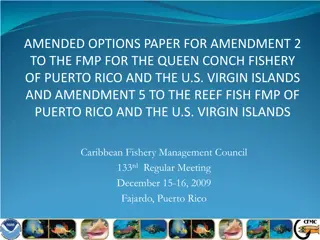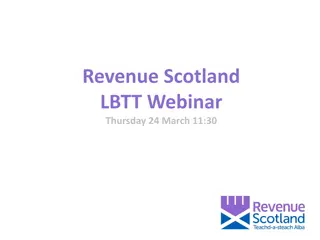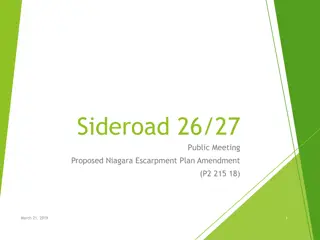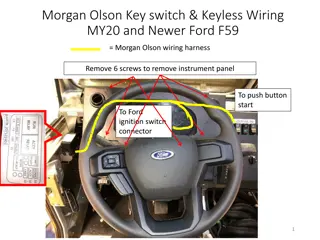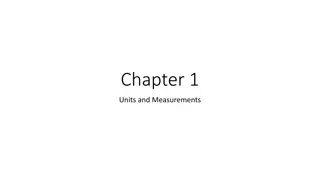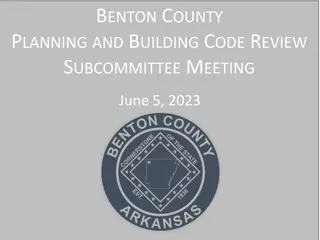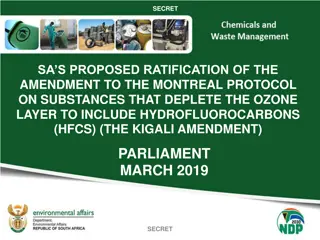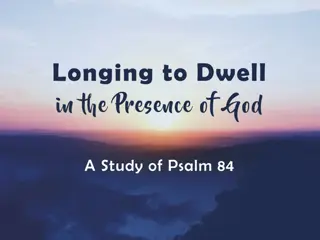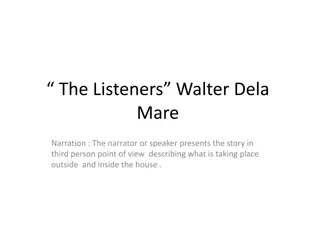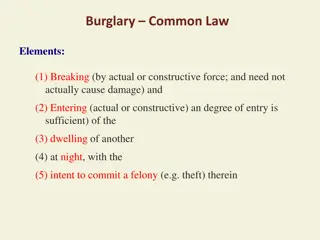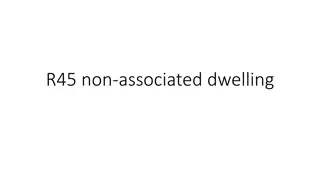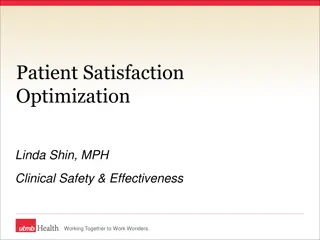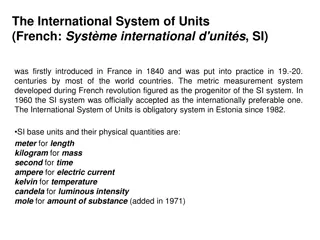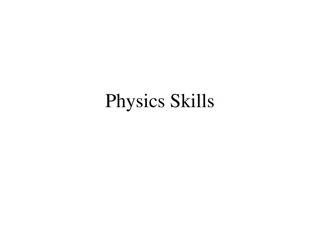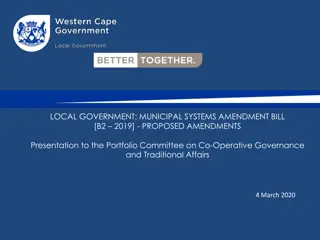Proposed Amendment for Accessory Dwelling Units by Linda Olson Pehlke
Proposed amendment aims to remove the investor-owner option and retain key features defining ADUs as distinct from two-family units. The intent is to provide housing opportunities while addressing changing household needs and prohibiting short-term rentals. Non-owner-occupied units may pose challenges to neighborhoods.
Download Presentation

Please find below an Image/Link to download the presentation.
The content on the website is provided AS IS for your information and personal use only. It may not be sold, licensed, or shared on other websites without obtaining consent from the author. Download presentation by click this link. If you encounter any issues during the download, it is possible that the publisher has removed the file from their server.
E N D
Presentation Transcript
WA - 13 Accessory Dwelling Units Proposed Amendment Linda Olson Pehlke, April 29, 2024
Context/Background Brookline ADU by-law passed in 2019 - Single-Family, Owner-Occupied Required 5 year occupancy before allowed to apply for permit. Restricted exterior appearance, prohibiting visible signs such as utility meters, extra entrance doors, etc. Proof of owner-occupancy through affidavit, etc. Agreement on removing these requirements. Single-family Lot sizes vary from 7,000 square feet to 40,000 square feet. Should be tailored by zone and T access.
Context/Background Very few ADU s resulting from by-law adoption. We do not know which factors limit ADU production. State legislature - Considering Healey bill that might mandate by-right ADU There has been strong municipal objections to another State mandate. Chelmsford Select Board Chair, Crocker Timmins testified that "It not only obliviates single-family housing zoning throughout the state, but it completely usurps the rights of each municipality to set criteria for this type of usage that's tailored to that municipality, Lowell Planning Board Vice Chair Gerard Frechette said he's also worried about "potential negative impact" from ADU reforms. In a community like Lowell that has legal conforming single-family building lots as small as 3,000 square feet, and our largest single-family lots being only 10,000 square feet, the by-right ability to create two-family rental houses in every single-family zone could have a detrimental effect on various areas of the city,"
Context/Background Town Assessor states that average ADU will be valued at $250,000 in additional value to the principal house. Depending on occupancy taxes could be too little to pay for additional Town costs for services, etc. Could take position that we should just wait for State to act, or we could make minimal changes because we will be re-visiting if State passes bill. HAB, in proposing by-right two-family rental housing for all single-family properties are trying to pre-empt State action with removal of owner- occupancy requirement, but passage and in what form, remains highly uncertain. De-facto two-family zoning. Starting Comprehensive Plan that could and should vet any substantive proposed changes to single-family zoning in terms of authentic public engagement and analytical assessment of impacts.
Proposed Amendment Remove Investor-Owner Option
Intent of Pehlke Amendment Retain many of the suggested regulatory simplifications proposed in WA-13 Retain key features that define ADU s as distinct from Two-Family. Smaller units Owner-occupied Flexibility to address changing household needs not provide major developer/investor opportunities Prohibition on Short-Term Rentals Smaller (cheaper) units provide valuable niche in housing opportunities. Non-owner occupied opportunity makes our neighborhoods vulnerable to absentee landlords, disruptive behavior, neglected properties, higher rents. Ability for by-right second unit is an incentive to developers/investors. Could foster Investor vs. Family ownership of Single-Family homes.
Investor Activity in Real Estate Markets A Metropolitan Area Planning Council, (MAPC) Report, Homes for Profit: Speculation and Investment in Greater Boston , published November 28, 2023 found that 21% of the transactions spanning 2004 through 2018 were by an investor or speculator (MAPC) has found that competition from highly capitalized investors and cash buyers is taking over a significant share of the Greater Boston housing market and pushing out traditional buyers of both single-family homes and multi-family apartment buildings. This research puts data behind a notion that people have had for years: speculators are driving up housing costs in Greater Boston. Further investor purchasers are more likely to buy properties with cash, purchase homes at a discount, and flip properties for profit, making it even more difficult for families and owner-occupant buyers to purchase a home. Limited Liability Corporations (LLC) which came on the scene in the 1990 s, account for a growing share of real estate investors and can contribute to poor property maintenance, difficulty with local by-law enforcement and irresponsible rental practices1. (The Organization of Neglect: Limited Liability Companies and Housing Disinvestment, Adam Travis, 2019)
Modify WA 13 ADU Size Limits 1. No accessory use or uses within a building shall occupy more than a combined total of 25 per cent of the floor area of the principal building, other than required off- street parking, except that an accessory dwelling unit may occupy up to the lesser of 900 950 square feet of habitable space or 40 30 percent of the floor area of the principal building by right or, by Special Permit, up to the lesser of 950 1200 square feet of habitable space or 40 percent of the floor area of the principal building. This proposed amendment was adopted by the Advisory Committee s Sub-Committee, anticipate that HAB version will reconcile to these standards.
Retain Requirement for Owner-Occupancy Delete proposed new Section 4.02.3.b.2 that allowed Investor-Owner Retain existing Section 4.02.3.b.2 with modifications 4.05.3.b.2 Owner-occupancy. A property containing an accessory dwelling unit shall be owner- occupied, which requirement may be met via either the principal or the accessory dwelling unit. Qualifying owner-occupancy must be certified as a precondition for receiving a Certificate of Occupancy for the accessory dwelling unit. Such owner-occupancy shall remain in effect and be verified annually through the Residential Exemption database to permit continued occupancy of the Accessory Dwelling Unit. and[LP1] not less than once per calendar year thereafter, by an affidavit, in a form to be provided by the Building Department and signed by the owner-applicant . Copies of the completed Affidavits of Owner-Occupancy shall be retained by the Building Department[LP2] . [LP1]This is adding language that was proposed by Dick Benka and adopted by HAB in their substitute version of 4.05.3.b.2 Using the residential exemption data base removes documentation burden from property owner and Building Commissioner. [LP2]This proposed amendment removes this onerous bureaucratic requirement.
All other changes are consistent with HAB version of WA -13 Streamlined compliance via Residential Exemption database. Prohibits Short-term Rentals. Removes prohibition on utility meters, addresses, multiple entrances, etc. Provides for penalties for non-compliance. Conversion of garages clarified. Conversion of non-habitable space & additions clarified.
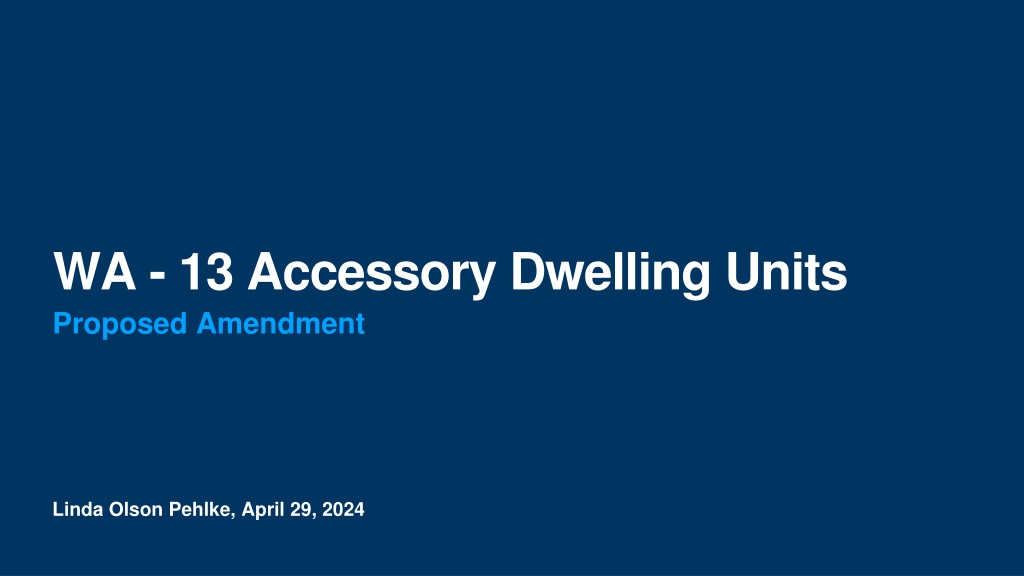

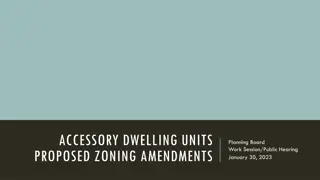
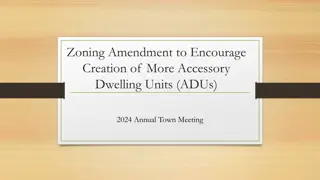
![Homeowner's Guide to Accessory Dwelling Units (ADUs) in [Jurisdiction]](/thumb/179471/homeowner-s-guide-to-accessory-dwelling-units-adus-in-jurisdiction.jpg)
